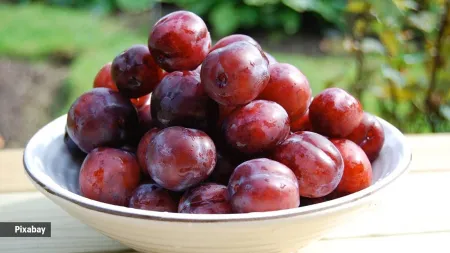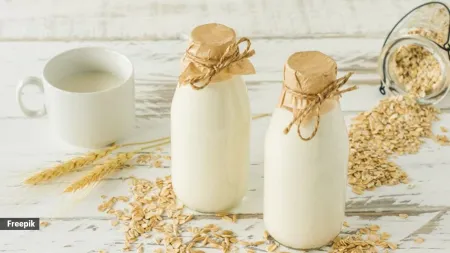Nutrition alert: Here’s what a 100-gram serving of mishrikand contains
Jicama, also known as mishrikand, is a root vegetable native to Mexico and Central America that offers a unique combination of flavour and health benefits. It resembles a potato with a similar texture, including thick, brown skin and white flesh. But, it tastes more like an apple, albeit less sweet. Unlike apples, however, mishrikand does not brown after being cut.
Sanchi Tiwari, nutritionist, Lord’s Mark Biotech, says, “A powerhouse of nutrients, mishrikand is packed with essential vitamins such as Vitamin C and Vitamin B6. Vitamin C bolsters the immune system, supports oral health, and reduces inflammation, while Vitamin B6 contributes to brain function and red blood cell formation.”

Moreover, she says, it contains antioxidants that combat cell damage, potentially lowering the risk of chronic diseases like cancer, diabetes, and heart disease.”
Furthermore, it serves as a hydrating snack due to its high water content, making it an ideal choice for maintaining hydration levels, particularly in hot weather. Its low glycaemic load, Tiwari suggests, makes it suitable for individuals monitoring blood sugar levels, offering a safe alternative for those with diabetes or insulin sensitivity.
In essence, it stands out as a nutrient-rich vegetable that not only satisfies the palate but also contributes to overall well-being and vitality.
Nutritional profile of mishrikand
Each 100-gram serving of mishrikand contains:
- Calories: 49.4
- Protein: 0.94 g
- Fat: 0.12 g
- Carbohydrates: 11.5 g
- Fibre: 6.37 g
- Calcium: 15.6 milligrams (mg)
- Magnesium: 15.6 mg
- Phosphorus: 23.4 mg
- Potassium: 195 mg
- Vitamin C: 26.3 mg
Mishrikand also contains small amounts of vitamin E, thiamine, riboflavin, vitamin B6, pantothenic acid, calcium, phosphorus, zinc and copper with antioxidants. Further mishrikand helps to prevent cell damage and reduce oxidative stress.
 Mishrikand serves as a hydrating snack due to its high water content, Sanchi Tiwari, nutritionist, Lord’s Mark Biotech says. (Source: Freepik)
Mishrikand serves as a hydrating snack due to its high water content, Sanchi Tiwari, nutritionist, Lord’s Mark Biotech says. (Source: Freepik)
How is mishrikand beneficial for health?
Mishrikand (pachyrhizus erosus, fabaceae) is a potent medicinal plant that is commonly served as raw or processed edible tuberous dishes, according to Tiwari. “It is a good source of antioxidant, prebiotic, helps in blood sugar regulation, is very low in sugar and fat and maybe a suitable replacement for starchy, higher carbohydrate vegetables. As a low-calorie and nutritionally dense food, it may be a good potato substitute for people with diabetes,” she says.
Mishrikand can be further beneficial for health in the following ways:
Nutrient rich: Mishrikand is packed with essential vitamins and minerals, including Vitamin C, folate, potassium, magnesium, iron, and manganese. It is low in calories but high in fibre, making it a weight loss-friendly food that promotes satiety and aids digestion.
Antioxidant powerhouse: With significant amounts of antioxidants like Vitamin C, Vitamin E, selenium, and beta-carotene, mishrikand helps neutralise free radicals and reduce oxidative stress, potentially lowering the risk of chronic diseases such as cancer, diabetes, and cardiovascular diseases.
Heart health: Mishrikand contains soluble dietary fibre that helps lower cholesterol levels and potassium, which helps regulate blood pressure by relaxing blood vessels. Its iron and copper content supports healthy red blood cells and circulation, while nitrate improves blood flow and reduces the risk of blood clots.
Digestive health: High in fibre and water, it promotes healthy bowel movements and eases constipation. Its prebiotic fibre, inulin, feeds beneficial gut bacteria, improving gut health and reducing the risk of obesity, heart disease, and diabetes.
Cancer prevention: The antioxidants and fibre in mishrikand have protective effects against certain types of cancer, particularly colon cancer. Inulin fibre acts as a prebiotic, promoting the growth of healthy gut bacteria and enhancing the immune response against cancer cells.
Weight management: As some nutrient-dense, low-calorie food rich in fibre and water, this vegetable helps control appetite, stabilise blood sugar levels, and increase insulin sensitivity, potentially aiding weight loss efforts.
Versatile and delicious: Mishrikand can be enjoyed raw or cooked in various dishes, adding crunch and flavour. Whether eaten plain, with dips, or incorporated into salads and stir-fries, it offers a tasty and nutritious addition to any diet.
Potential culinary uses and preparation methods that preserve the nutritional integrity of mishrikand
Tiwari says that mishrikand is commonly enjoyed raw in salads, providing a refreshing crunch alongside other vegetables. “Mishrikand sticks make for a nutritious snack when paired with dips like hummus or salsa. Pickling the vegetable also maintains its nutrients while adding a tangy twist, and it can also be stir-fried briefly to retain its crunchiness,” she adds.
Grating mishrikand for slaws or spiralising it into noodles, she says, offers versatile options for incorporating it into dishes. Lightly baking the slices or fries creates a healthier alternative to traditional snacks. Overall, combining mishrikand with nutrient-rich ingredients ensures its nutritional integrity is maintained in various culinary creations.
One should be able to preserve the nutritional integrity of mishrikand by consuming it raw or lightly cooked, Tiwari recommends. In case if overcooked, it can lead to a loss of nutrients. It would be adding additional value if we pair mishrikand with other nutrient-rich foods like vegetables, lean proteins, and healthy fats as it can enhance its overall nutritional value in a dish.
Disclaimer: The copyright of this article belongs to the original author. Reposting this article is solely for the purpose of information dissemination and does not constitute any investment advice. If there is any infringement, please contact us immediately. We will make corrections or deletions as necessary. Thank you.





